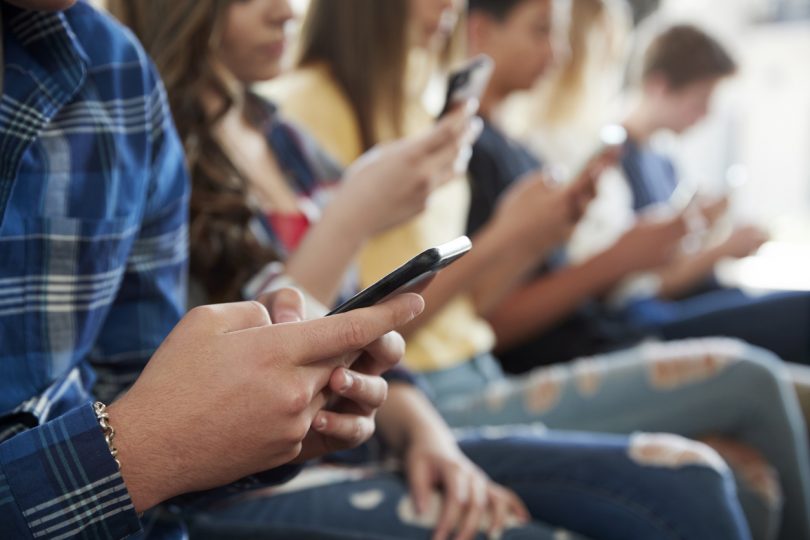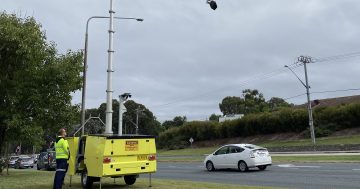
From next year Victoria will ban mobile phones from all public schools but the ACT Government is resisting a Federal Government push to do likewise.
The ACT Government is rejecting a Federal Government push to follow in the Victorian Government’s footsteps and ban mobile phones in public schools.
At an Education Council meeting in Melbourne on Friday (28 June), Federal Education Minister Dan Tehan told state and territory education ministers of the Morrison Government’s plans to deliver on an election commitment to remove mobile phones from classrooms in the current term of office.
But while this proposal lines up with Victoria’s plans to ban phones from public schools as of next year, it is opposed by ACT Education Minister Yvette Berry and her counterparts in Queensland, the Northern Territory and NSW (which currently has a ‘primary school only’ ban).
“The Morrison Government wants to see mobile phones out of the classroom to remove a distraction and reduce the incidence of cyberbullying and other inappropriate usage,” Mr Tehan said following the Education Council meeting on Friday.
“We have told all states and territories we will invite experts from France and Ontario, Canada, where phones have been banned from schools, to provide advice about their experiences.”
However, while Ms Berry is interested to hear how the Victorian ban is implemented, at this stage she believes that banning mobile phones from schools is not the “best way to support the development of children and young people”.
“Owning a device provides a great opportunity for students to expand their learning journey and we have some great examples in ACT public schools on using devices to enhance classroom activities,” Ms Berry said.
“Helping students understand what appropriate behaviour is both on and offline should be part of that learning journey.
“It’s important that children and young people are taught how to live alongside devices appropriately because this is a big part of our life now.”

Yvette Berry does not want to ban mobile phones from ACT schools as she believes using phones is part of the ‘learning journey’. File photo.
On Wednesday (26 June), Victorian Education Minister James Merlino announced that mobile phones will be banned for all students at Victorian state primary and secondary schools from Term 1 2020, to help reduce distraction, tackle cyberbullying and improve learning outcomes for students.
From next year, Victorian students will be required to switch off their phones and store them securely in lockers from the start of the school day until the final bell. When emergencies occur, parents or guardians will be asked to call the school to reach their child.
The only exceptions to the ban will be where students use phones to monitor health conditions, or where teachers instruct students to bring their phone for a particular classroom activity.
“This will remove a major distraction from our classrooms, so that teachers can teach, and students can learn in a more focused, positive and supported environment,” Mr Merlino said.
“Half of all young people have experienced cyberbullying. By banning mobiles we can stop it at the school gate.”
The Victorian mobile phone ban has been supported by psychologist Dr Michael Carr-Gregg who said that all schools have a legal obligation to provide a safe environment in which to learn.
“This significant policy initiative is designed to ensure the well-being of young people while at school, free of distraction and potentially cyberbullying.”
However, the ACT Education Directorate said that what is important is the way these devices are used, rather than the devices themselves.
“Personal electronic devices such as smartphones are a common part of modern society and we need to build an understanding with our young people about the appropriate use of these devices in different contexts rather than simply a blanket ban,” a spokesperson for the ACT Education Directorate said.
“Our teachers teach to the Australian Curriculum, which expects students to develop skills using a range of devices for learning over their years of schooling. Devices such as smartphones and tablets can complement existing learning and teaching for those that wish to use them.
“For example, in an ACT high school, students may give a presentation to the class on a Chromebook while using a smart device for speaking notes,” the spokesperson said.
“Students may use a Virtual Reality application on a smartphone with the headset as part of an interactive project in class, or may make use of the light, mobile aspect of a smartphone or device by using them to take photos or to access appropriate learning apps for travelling class assignments.”
The Education Directorate spokesperson said that different schools and year levels have different approaches to the use of technology, including personal smartphones, for teaching and learning within class time.
“For example, many of our primary schools have a process where phones are left in bags or checked in to the front office for the day,” the spokesperson said.
“Schools partner with students and parents and carers to develop safe and appropriate skills in the use of ICT. This includes the necessary judgement on the benefits and consequences of the use of ICT across their school and social life so they are better equipped to make decisions about its use.”
In December last year, President of the ACT Parents and Citizens Association Kirsty McGovern-Hooley told Region Media that, while bans were not considered the best way to deal with mobile phone issues in schools, the situation across ACT schools was a bit disconnected.
“I would rather it’s not left up to the individual schools. I would rather we had something that’s standardised across all schools.”
Do you think mobile phones should be banned in ACT schools or are they an important part of the modern learning environment? Let us know your thoughts in the comments below.


















